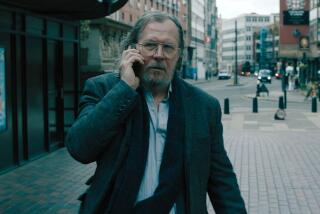‘The Last Station’
He was the celebrated author of “War and Peace,” but the last years of Leo Tolstoy’s life were all war and no peace. The savage rivalry for his attention and legacy between his redoubtable wife and his craftiest disciple that overshadowed his final days has now been turned into a showcase for tasty acting by performers who really know how to sink their teeth into roles.
Under the accomplished direction of Michael Hoffman, who also wrote the script, “The Last Station” is well-acted across the board, but the film’s centerpiece is the spectacular back and forth between Christopher Plummer as the great man, a count as well as a writer, and Helen Mirren as Sofya, his wife of 48 years and always a force to be reckoned with. For those who enjoy actors who can play it up without ever overplaying their hands, “The Last Station” is the destination of choice.
The notion for “The Last Station” came from writer Jay Parini, who was so fascinated to discover that numerous people around Tolstoy in the fatal year of 1910 kept diaries with their versions of events that he wrote a novel telling the story from six points of view. Hoffman’s screenplay simplifies this a bit but keeps the story’s fine sense of the complexities of human relationships, of the war in Tolstoy’s household between the welfare of family and the welfare of mankind.
After brief glimpses of Tolstoy and Sofya, “The Last Station” introduces the film’s audience surrogate, young Valentin Bulgakov (“Atonement’s” James McAvoy), who is applying for the job of the great man’s secretary. A bright-eyed and naive young zealot, a priggish follower of the worldwide Tolstoyan movement that espouses celibacy, communal property and passive resistance, Bulgakov is shocked to discover that the man hiring him expects him to spy on the Tolstoys as part of his duties.
That man would be Vladimir Chertkov, a devoted acolyte of the writer and the head of his international movement. Expertly played by Paul Giamatti, who brings energy and passion to the most unlikely and unlikable roles, Chertkov is sincere in his own way, a true believer as well as an oily and ambitious fussbudget. He knows he has no greater enemy than Sofya (hence the spying), who wants the royalties from her husband’s work to stay in the family, while Chertkov wants the copyright deeded to humanity.
Before he gets to the Tolstoy estate at Yasnaya Polyana and begins his duties, Bulgakov makes a stop at a dreary Tolstoyan commune, where he makes the acquaintance of Masha (Kerry Condon), a frank, unabashed young woman who sees a spark of something in him that he doesn’t even see himself.
Though the working out of this relationship is fine as far as it goes, and even includes a spicy bedroom scene, the real romantic interest in this film is the complex and compelling love story between Tolstoy and the woman who bore him 13 children, the woman who copied out “War and Peace” in longhand six times, the great passion and frustration of his life, the Countess Sofya.
From the opening shot of her air of regal command coming down a flight of stairs, Mirren, whose father was Russian, fearlessly seizes this role with both hands and does not let go. She is as conservative as her husband is anarchic, his opposite number in any number of ways, and she is not shy about expressing her opinions. When the count says “my privilege revolts me,” she snaps back, “but you are always the first one at the trough,” and when her archenemy Chertkov appears, she does not hesitate to call him “a senile middle-aged flatterer.”
If Sofya is tightly wound, Plummer shrewdly plays Tolstoy as someone who has relaxed into his greatness. Looking like a frontman for ZZ Top crossed with a Talmudic sage, his Tolstoy has a largeness of spirit that transcends conventional boundaries and makes it impossible for him to be constrained by anything, not even his own philosophy.
Plummer’s work is not as outwardly showy as Mirren’s but it is every bit its equal, and the great thing about “The Last Station” is the way these larger-than-life performances complement each other. These are people who simultaneously love each other and drive each other crazy, and the bond between them, running the gamut from bedroom intimacies to full-out brawls, is one we absolutely believe.
Seeing it all makes it understandable that Tolstoy took the final journey that ended at the train station at Astapovo, giving the film its title, but it doesn’t make it any less haunting. If “The Last Station” begins with a quote from “War and Peace’s” Prince Andrei that “everything I know I know only because I love,” it ends with our understanding of how complicated that simple sentence turns out to be.
More to Read
Only good movies
Get the Indie Focus newsletter, Mark Olsen's weekly guide to the world of cinema.
You may occasionally receive promotional content from the Los Angeles Times.











